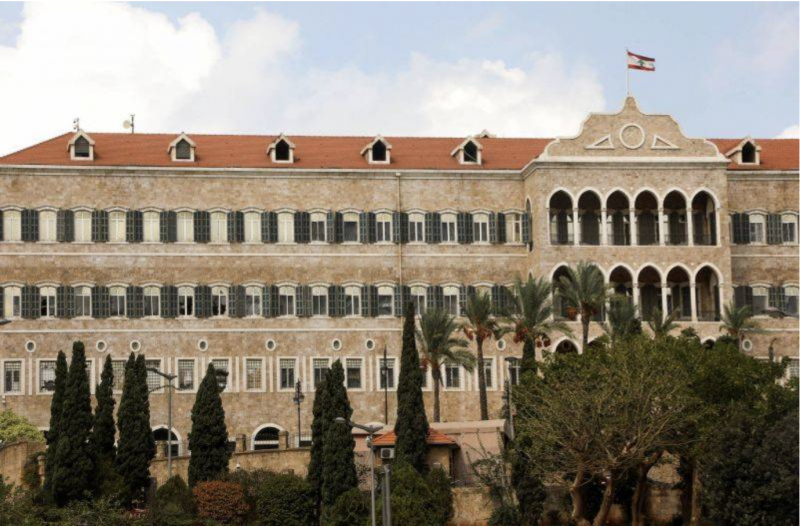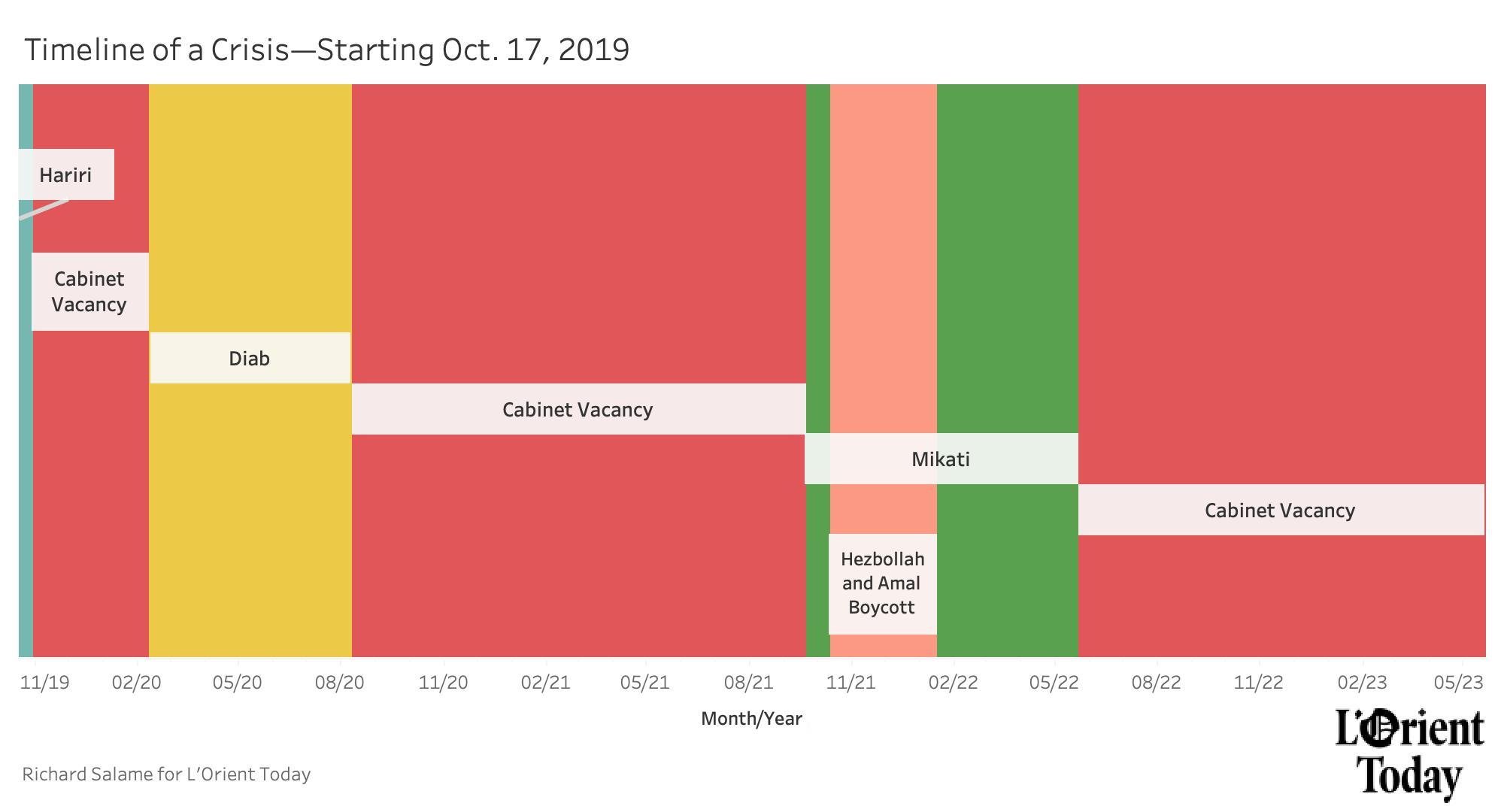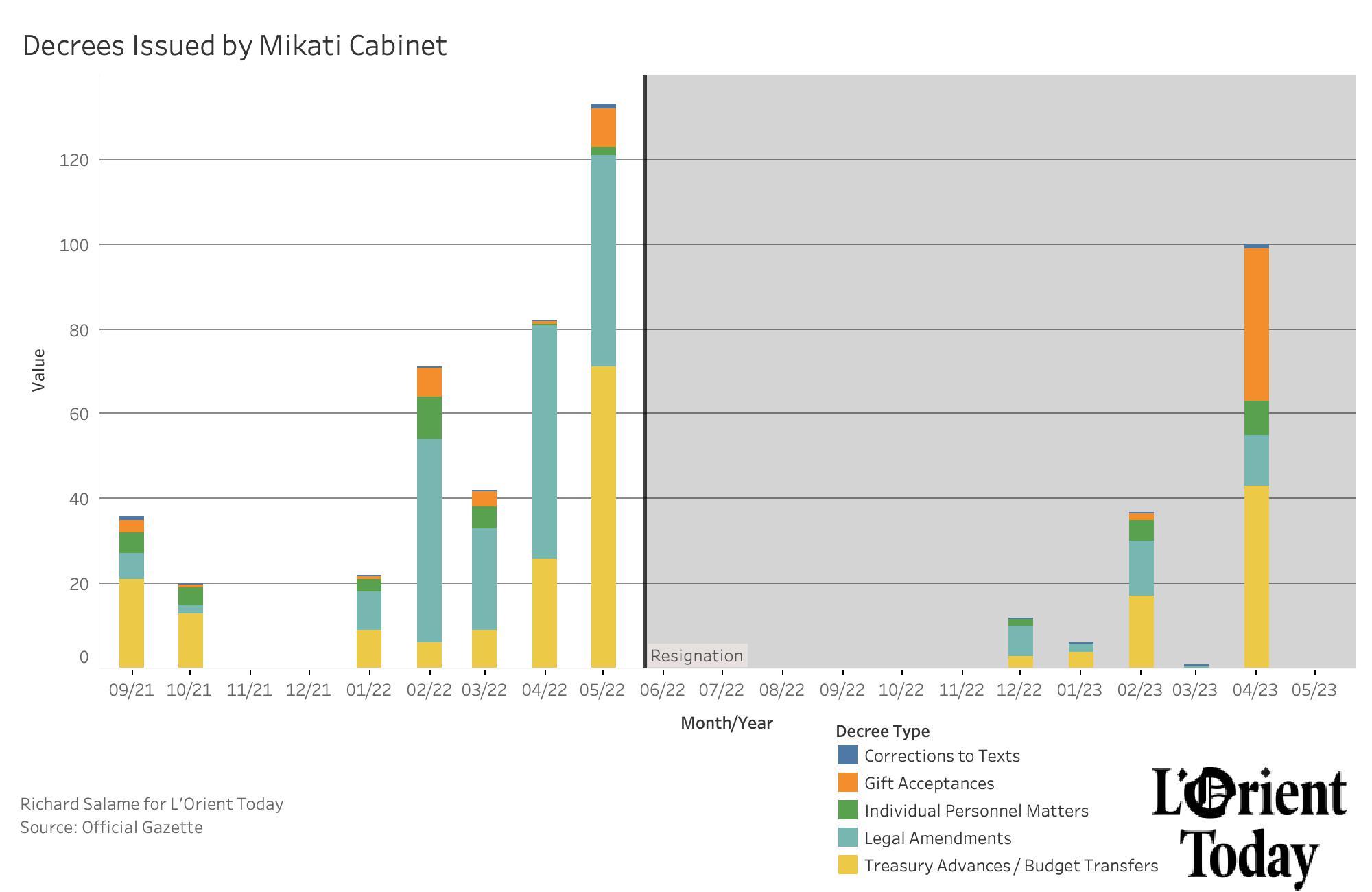
The Grand Serail in Beirut. (Credit: Mohamed Azakir/Reuters)
Monday, May 22, 2023 marks one year since then-President Michel Aoun declared the cabinet officially resigned following parliamentary elections.
Lebanon is currently experiencing the second-longest cabinet vacancy in its post-Civil War history and could well beat the record set just two years ago with the 406-day vacancy between the resignation of Hassan Diab’s government and the confidence of Mikati’s third cabinet.
The current cabinet informally met Monday for a consultative session ahead of a formal session expected on Friday.
The very holding of cabinet sessions remains politically contentious, with the Free Patriotic Movement and Lebanese Forces, in particular, claiming that the caretaker cabinet can only discuss “urgent” matters in the absence of a president.
L’Orient Today breaks down the data, and the days, of Lebanon’s most recent year without a government:
The current cabinet’s 365 days in caretaker status greatly exceeded the 244 days during which it was fully empowered. For almost half of the time it was fully empowered, the cabinet could not convene due to a boycott imposed by Hezbollah and Amal.

Of the 1,313 days since the start of the thawra ("revolution") on Oct. 17, 2019, Lebanon has been without an empowered cabinet for 876 days, or 67 percent of the total period.
If we include the boycott period during the Mikati cabinet, the time without a fully empowered cabinet rises to 971 days, or 74 percent of the total time period.
Lebanon has also been without a president since the end of Michel Aoun’s term on Oct. 31.
Is the caretaker cabinet getting more active?
Amid the prolonged executive vacuum in the country, the caretaker cabinet appears to be making its way back into legislating.
In November 2022, Parliament ruled that the caretaker cabinet could meet in exceptional situations. Parliament itself is theoretically unable to legislate until it fulfills its role as an electoral body to elect the next president, but that did not prevent it from passing laws to postpone municipal elections and weaken the 2021 public procurement reform.
L'Orient Today counted 100 decrees approved during the most recent cabinet session on April 18, but more may be announced in future editions of the government’s official gazette.
These included 43 treasury advances and budget transfers, and 12 pieces of legislation, including pay increases for public sector workers and an increase in the minimum wage.
Measured by the number of decrees passed, it was the busiest cabinet meeting since Mikati’s government was formed in September 2021, despite its caretaker status and that some factions insist the caretaker cabinet must limit its activities until a new president is elected.
From May 22, 2022 — when the Mikati government resigned — until Dec. 5, 2022, the caretaker cabinet did not meet. It has met five additional times since Dec. 5, with a sixth formal session expected on Friday.
Since its resignation, Mikati’s cabinet has collectively issued 156 decrees. (Additional decrees were issued between May 22, 2022 and Oct. 31, 2022, by mutual consent of the caretaker Prime Minister and President, without convening the cabinet.)
The largest body of new legislation issued by the caretaker cabinet is treasury advances and budget allocations. It has also accepted 38 gifts and made 15 personnel decisions.
Of its 35 legislative decrees, the most significant are those modifying the rate at which VAT is collected and payroll policy for the hundreds of thousands of state and military employees and pensioners.

Cabinet by the numbers
From September 2021 to today, Mikati’s cabinet has held 38 sessions. Two of those sessions came before it gained Parliament’s confidence on Sept. 20, 2021, and were dedicated to drafting and approving the ministerial statement.
It met 30 times as a fully empowered body, issuing 406 decrees in that time.
Based on L’Orient Today’s review of nearly 120 issues and addendums of the official gazette published from September 2021 until the present, the cabinet transferred money from the general budget to different departments (or offered a department a treasury advance) 155 times during its period of full empowerment.
It accepted 26 gifts from domestic and foreign individuals, companies, and governments. For example, the German Federal Police last year gifted Lebanese General Security with used vehicles, office supplies, and printer ink.
The cabinet made 29 high-level personnel decisions, such as accepting promotions and resignations, and it issued 194 legal decrees.
Among its major decisions made as a fully-empowered cabinet, Mikati’s government approved drafts of the 2022 budget and a capital control law, approved an economic rescue plan, and approved an electricity sector plan, none of which took the form of cabinet decrees and are therefore not part of the 194 decisions mentioned above.
Most of its official decrees consisted of more mundane business, such as authorizing universities to change the names of departments, extending the time frame for construction permits, and allowing foreign NGOs to establish local offices.
With many crises facing the country, the executive branch has shown a dramatic slowdown in government business as a result of entering caretaker status, declining from 1.7 decrees to 0.4 decrees per day.